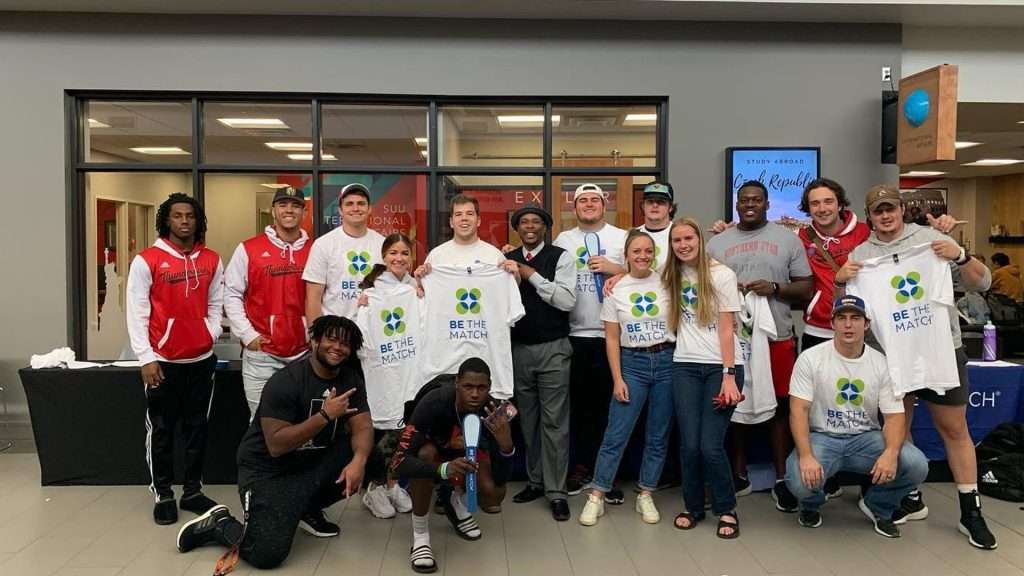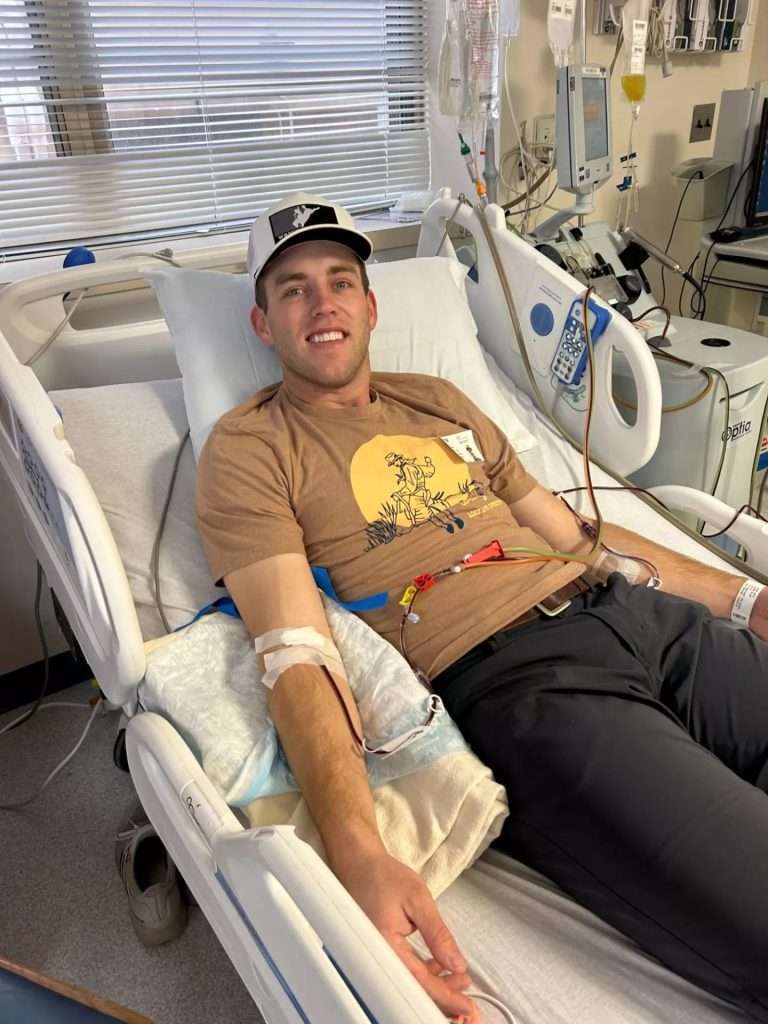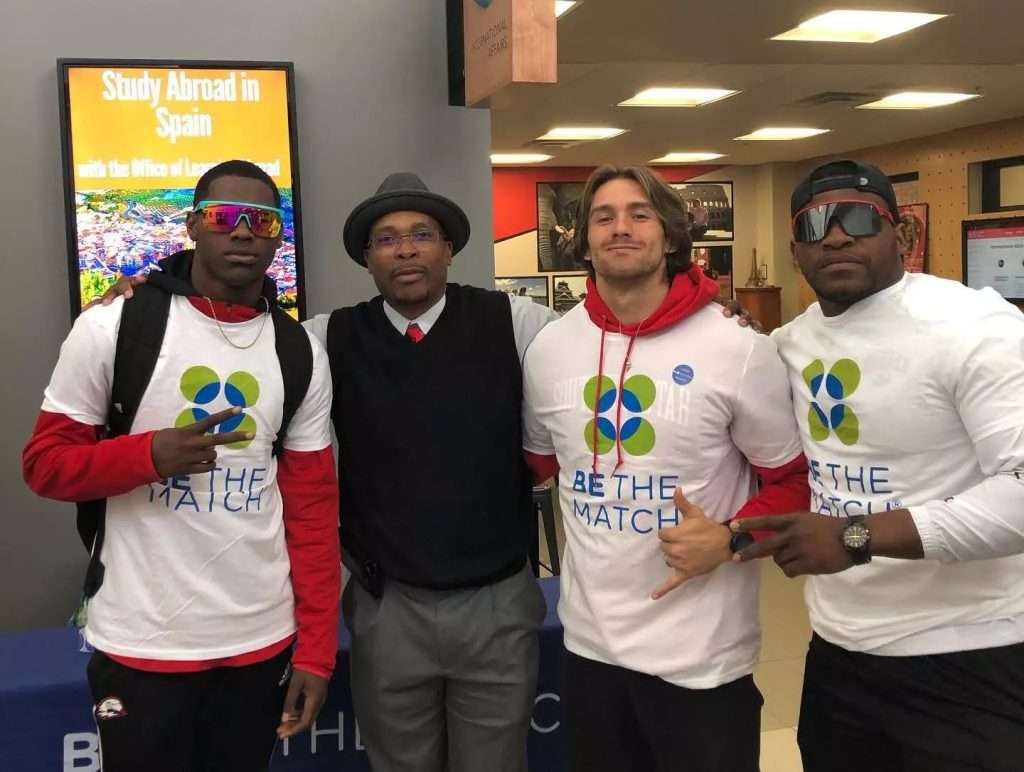by Regan Hunsaker, SUU ATHLETICS
CEDAR CITY, Utah – For the past three years, the Southern Utah football program has proudly partnered with the National Marrow Donor Program (formerly Be The Match) to help save lives. Through an annual donor registry sign-up event, the Thunderbirds have made it their mission to raise awareness and increase the number of potential donors who could provide life-saving blood stem cell transplants.
This partnership was initially brought to SUU by Assistant Head Coach Darrius G. Smith, who has a long-standing history with the program. Throughout his coaching career, Coach Smith has been actively involved in Be The Match, recognizing its impact on patients battling blood cancers and disorders. Upon joining the Thunderbirds, he worked to establish the program in Cedar City and has expanded it by partnering with SUU’s Nursing program.
“I started working with it when I was at Villanova. It was part of Coach Andy Tally’s service project. He’s become, I think, their national ambassador if you look up the program and Coach Tally’s background,” Smith explains. “It was something we did at Villanova, and I continued implementing it at UMass, Bryant, and now here at SUU. We’ve built it into a full-scale donor drive with our players actively recruiting participants on campus.”
Coach Smith emphasizes that getting athletes involved in a cause like this instills a sense of responsibility and compassion beyond the game. “Football teaches discipline and teamwork, but it also teaches us how to serve others. Be The Match is an opportunity to save lives even though it’s not me directly saving a life. It helps me expand the gruff exterior that most people have of football players, especially African American football players. It improves their ability to reach out to the community,” he says.
The football program hosts an on-campus donor registry event each year, where players, students, and community members can join the registry with a simple cheek swab. Over the years, SUU football has registered hundreds of potential donors, increasing the likelihood of a match for patients in need.
“We want this to be something that continues long after these players leave SUU,” says Coach Smith. “We’re not just building football players—we’re building men who understand the value of giving back.”
The impact of SUU’s involvement with Be The Match became even more personal this year when former Thunderbird linebacker Dillon Smith was notified that he had been matched with a patient in need. A few weeks ago, Smith traveled to Washington, D.C., to make his life-saving donation.
“I signed up never thinking I’d actually be called, but when I got that message, I knew I had to do it. Someone out there needed me, and I wasn’t going to let them down,” Smith shares. “This isn’t a hard thing for me to deal with… A headache or two and a few days off work is all it is for me, but being able to give and having the chance to help somebody out was really cool.”
The donation process, while rigorous, was something Dillon embraced wholeheartedly. Dillon also spoke of the changes that came when Coach Fitzgerald took over the SUU football program. “The coaching staff knows the importance of community service, of life after football, just being good people. In Coach Fitzgerald’s first year, the staff always talked about being one percent better and how you can be better… being a good person helps you be a good football player. And them teaching that and preaching that has helped a lot of student-athletes and students around SUU become better people, and hopefully go out into the community and be great community members.” he says. “if you have the opportunity to go help somebody like this, there’s a good chance you don’t even match, but it’s a lot easier than you would think, and it’s a great opportunity.”
Head Coach DeLane Fitzgerald has emphasized the importance of the program, not just for the football team but for the broader SUU community. He believes this initiative aligns with the team’s values on and off the field.
“We tell our guys that being a part of this program is bigger than football. It is an opportunity to save a life,” says Coach Fitzgerald. “It’s about stepping up when someone else needs you. It’s about being a leader in the community and setting an example.”
The program has also had a lasting impact on SUU’s student-athletes, instilling in them a sense of purpose beyond their sport. Many players who have registered in previous years continue to advocate for Be The Match, encouraging others to sign up and spread awareness.
The SUU football program remains committed to growing its involvement with the National Marrow Donor Program, ensuring that more lives can be saved through increased awareness and donor participation. By continuing their annual donor drive, the Thunderbirds are proving that their impact extends far beyond the field—it reaches those in dire need of a life-saving donation.
This Years Drive
Keep an eye out for the donor registration drive on campus on April 17-19. As with previous years, football players and nursing students across campus will be looking to help new potential donors sign up for the program.
More About The National Marrow Donor Program
Be The Match, now operating as the National Marrow Donor Program (NMDP), is a global nonprofit organization dedicated to connecting patients with donors for blood stem cell transplants. For many individuals diagnosed with leukemia, lymphoma, or other blood disorders, a transplant is their best hope for survival. However, only about 30% of patients find a fully matched donor within their own family, making the registry crucial for those in need—especially individuals with diverse ancestry, who are often underrepresented.
How does the National Marrow Donor Program work?
Patients with blood cancers or disorders search the NMDP Registry for a donor.
Doctors match donors and recipients based on human leukocyte antigens (HLA).
In some cases, donors and recipients can meet after the transplant.
What does the NMDP do for patients?
Covers medical costs for the transplant, including travel expenses.
Provides patients and their families with support, education, and guidance throughout the process.
How can you get involved?
Register to be a blood stem cell donor.
Fundraise to help expand life-saving efforts.
Become a legislative advocate to improve patient access to care.
Donate to the NMDP to support its mission.




